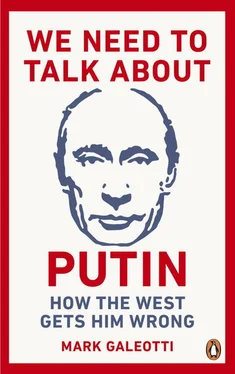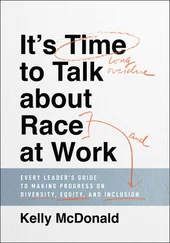Chapter 6: Putin Is Risk-Averse, Not a Macho Adventurer
Being one of Putin’s bodyguards can make your career. The head of his security detail, Viktor Zolotov, was appointed in 2016 to lead the newly formed National Guard – a domestic security force more than twice the size of the entire British armed forces – and has also amassed a property portfolio worth millions of pounds on an annual salary of just over £70,000. Another of Putin’s security team, Yevgeny Zinichev, became first governor of the Kaliningrad Region and then Minister of Emergency Situations. A third, Alexei Dyumin, is now governor of the Tula Region. This is in part because, as his circle has shrunk, increasingly the only people Putin knows are his guards, drivers, aides and umbrella-carriers. In fairness to them, they also earn it by the way they have to balance the need to indulge the boss’s taste for macho theatrics – diving for archaeological remains off the coast of Greece, tranquilising a Siberian tiger, riding with a motorcycle gang, taking to the rink for a high-octane game of ice hockey – with the massive behind-the-scenes preparation and choreography that ensures nothing poses the slightest real danger for ‘The Body’, as he is known in his inner circle.
In many ways this paradox is a metaphor for Putin, the man of many masks. At home he poses as the tough-love, details-oriented chief executive, even though he clearly leaves much of the minutiae of government to others and is increasingly less actively involved in managing the country. Abroad, he poses as the devil-may-care adventurer, a bad boy not worth tangling with because he is so unpredictable and resolute. In practice, though, he is cautious and risk-averse. He is only happy to play the maverick when he thinks he can predict the outcomes. We previously saw a great deal more brazen pressure on the United States, for example, with Russian jets routinely ‘buzzing’, or flying intimidatingly close to, American planes and warships. This was technically risky, but Moscow considered it politically safe, because they trusted the professionalism of American soldiers and the maturity of the American government not to get spooked and turn a piece of geopolitical gamesmanship into a shooting war.
When Donald Trump was elected, the scale and tempo of such challenges diminished dramatically. The Kremlin – like the rest of us – really didn’t know what to expect. I would go into meetings with Russian foreign ministry officials, expecting to pump them for information and would find them somehow hoping I could tell them about the new American president, simply because I had lived in New York for seven years. In April 2017, the US launched cruise missile strikes on Syria, in response to a chemical weapons attack by government forces, seemingly because Trump was affected by coverage he saw on Fox News. The following day I happened to meet with one of those Russian officials – he was at his wits’ end, caught between an unpredictable American president and higher-ups who were demanding firm predictions.
Because Putin wants clarity, he wants safe choices and guaranteed successes, and when he doesn’t have them, the tough-guy president, the man who’s happy to throw out gangster slang and warn countries challenging him that they may become military targets, the man who once said, ‘Even fifty years ago, the streets of Leningrad taught me one thing: if a fight is inevitable, go and fight first,’ that man has a signature move: he hides.
On the night of 27 February 2015, for example, Boris Nemtsov, a former deputy prime minister and regional governor who was at the time the highest-profile democratic opposition leader in Russia, was walking over the Bolshoi Moskvoretsky Bridge, literally right by the Kremlin walls. Four shots were fired into his back, fatally injuring him. To some, this was a state-sanctioned hit, but it soon became clear that the murderers were security officers working for Ramzan Kadyrov, the head of the Chechen Republic. Kadyrov had helped Putin win the bloody Second Chechen War between 1999 and 2002. The irony is that in the name of preventing Chechnya from becoming independent, Putin allowed Kadyrov to establish himself as a virtually autonomous local warlord, paying off the local elite and bankrolling vanity projects in the Chechen capital Grozny at Moscow’s expense. Kadyrov has repeatedly faced allegations of murdering his enemies with impunity, even in Moscow, and there was a great deal of bad blood between him and Nemtsov.
We still don’t know whether Kadyrov ordered the hit directly or retrospectively blessed it, but he certainly made it clear that he was standing behind his guys: he described the man who confessed to carrying out the actual shooting as ‘a true patriot’. He wanted the case to go away, for a few scapegoats to be found and punished and a line to be drawn under the incident. Kadyrov’s enemies – which included the FSB and other elements of the security apparatus, who were angry at how he had locked them out of Chechnya and replaced their people with his own henchmen – saw this as an opportunity to take him down. A Russian journalist with good contacts in the FSB told me that ‘they had been waiting for something like this, for Kadyrov to do something stupid and shit on Putin’s doorstep’ – they believed that this time he had gone too far.
Putin was in the middle of this behind-the-scenes tug of war. And he hid. He disappeared for a fortnight while he fretted about what to do. If he exonerated Kadyrov, he would look weak and effectively be admitting that he couldn’t control Moscow. If he took on Kadyrov, he feared that the Chechen leader’s personal security forces, the so-called Kadyrovtsy , ‘Kadyrovites’, would avenge him, plunging Russia into a third vicious war in the region. Unsure which was the safest option, he withdrew from sight. Rumours abounded: there had been a coup, Putin was ill, he was dead, he had sneaked off to Switzerland for the birth of his love child. He would not even take Kadyrov’s calls, and the Chechen strongman surreally took to posting odes to his loyalty to Putin on Instagram, in the hope of getting through to the Kremlin.
What eventually emerged was not a decisive result but rather a mutually unsatisfying compromise worthy of any democratic deal-maker. Kadyrov received a tacit slap on the wrist, and was warned not to do it again. He also agreed to send some of his Kadyrovites to Syria as ‘military police’. But the hawks who wanted him brought down were told to cool it; the investigation was limited to the actual trigger-pullers, and no attempt was made to follow their chain of command. Kadyrov could continue to be Kadyrov.
Time and again, Putin either backs away from a tough decision, ducks out while he agonises, or hopes that with time, the need to make a decision will disappear. His ostensible acts of daring – such as the time he tranquilised a supposed wild tiger that turned out be a sedated animal from Khabarovsk Zoo – tend to be ones he thinks are actually safe.
In 2014, after Ukraine’s corrupt President Yanukovych had been toppled in the ‘Maidan Revolution’, Putin sent in his notorious ‘little green men’ to seize Crimea. These Russian special forces, their uniforms stripped of identifying badges, took the peninsula in a few days, almost without a shot being fired. It was hailed as an act of swashbuckling piracy, but the truth is that Crimea fell into his lap. The Ukrainian government had all but collapsed, its military high command was full of Moscow’s agents and sympathisers (the commander of the Ukrainian navy even switched sides), the Russian Black Sea Fleet was already based in Crimea because of an old treaty so the soldiers were already there, and many Crimeans, resentful of their own government’s neglect and aware of the higher living standards in Russia, were happy to support the annexation. After all, Crimea had been part of Russia until 1954 when (Ukrainian-born) General Secretary Nikita Khrushchev gifted it to Ukraine. The overwhelming majority of Russians, even those who were critics of Putin’s rule, felt it was rightfully theirs. So while he had taken a chance, not knowing how the West would respond, this was as safe an adventure as one could imagine.
Читать дальше












